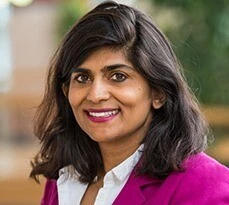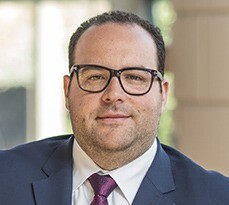Leading on “live learning”, the Cambridge MBA offers real-world business challenges with organisations as an intrinsic part of the programme, from the first term to the last.

Going beyond the typical case study or simulation, students apply newly acquired knowledge to deliver valuable outcomes for genuine clients.
This distinctive style of experiential learning makes Cambridge a first choice for MBA candidates looking to maximise their one-year learning time and make a fast and impactful re-entry into the world of work afterwards.
“I learn by doing, and so I looked at the curriculum of each MBA programme and I really liked the Cambridge MBA curriculum because every term there is a project for getting experience in the field. It was the environment that I was looking for,” says Sophia Foroudastan, (MBA 2019) CXO, Silver Street.
Going live, Cambridge style

There are three main practical projects across the Cambridge MBA year, including two live consulting projects with external clients. Skills and core management concepts learned in class are consolidated through intense practice and refined with peer feedback and mentor support – and ultimately, the satisfaction of the client with the end result.
Each project builds on the last to give Cambridge MBAs the professional resilience and global outlook to excel in their careers after graduating.
“The practical projects are an important part of the Cambridge MBA programme providing fantastic opportunities for students to apply their skills, experience new sectors and roles, and build networks with potential employers,” says Sadia Cuthbert, Head of MBA Business Development and Projects.
Deep diving with innovators, The Cambridge Venture Project

Within weeks of joining the MBA programme, students start working with innovative small-scale companies in and around Cambridge on market analysis strategies, or with global companies launching new initiatives. The Cambridge Venture Project (CVP) is their first opportunity to apply theoretical knowledge to create solutions in high-pressure, high-risk business environments. The possibility of working alongside entrepreneurs in ‘Silicon Fen’, one of the most important technology centres in Europe, is a big draw for MBA students.
“It was a really valuable experience to see how an early-stage company grows, and the challenges it faces. This insight into how funds are raised and the company’s relationship with investors will be a crucial advantage if I decide to start my own business,” says Nancy Luo, (MBA 2019). Nancy and her team worked with Cambridge start-up Mitt Wearables.

Tarek Mosfi (MBA 2019) and his study group were equally inspired by the opportunity to work with Paragraf, an exciting University of Cambridge spin-out company.
“I think we are going to hear a lot more about them in coming years. Paragraf has innovated graphene production and has a roadmap for 35 technologies. We interviewed a series of experts to come up with the best method to bring one of their products to market and scale it,” says Tarek, Project Manager, Visagio, Dubai UAE.
The benchmark for success is high. Project outcomes are scrutinised during presentations to the Cambridge Judge community. But clients come first. At the end of the six-week project students must impress senior managers with solutions that can be implemented.
“What I liked the most about the CVP is that we were playing a part in shaping a company’s strategic direction, even at an early stage of our MBA journey. Our recommendations had value and were going to be implemented,” says Tarek.

The project teams are deliberately designed to be cross-disciplinary and diverse. The Cambridge MBA cohort represents more than 40 nationalities.
“This really helps you to understand what your future managerial roles could look like. You won’t always be able to pick your own team and you may not always come from the same place or background,” says Simon Schwartz, (MBA 2019), Senior Product Marketing Manager, Synthesized.
Students get to learn on the job with international classmates who bring a wealth of experience and perspectives as teams tackle real-world problems.
“The number of opportunities you get to work in teams is unique to this programme,” adds Simon, who was excited to consult through his CVP for Active Needle Technology, a medical device start-up company.
A grand design, The Global Consultancy Project
If the CVP is a vital foundation of practical learning, then the Global Consultancy Project (GCP) is its superstructure. This highly regarded project opens global front doors. Amazon, Siemens, Nestlé, and the World Health Organisation are just some of the international names on its growing client list.
In 2021, our students worked on 39 GCP projects. Feted football clubs like Paris Saint-Germain FC and Liverpool FC, together with media giant Studio Canal, were among those recruiting MBAs through the Global Consultancy Project for the first time.
Each client is assigned a team of up to five students who have four weeks to solve an issue of strategic importance under the guidance of an academic supervisor. Students consistently rate the Global Consulting Project as a highlight of the Cambridge MBA programme. It’s a blue-chip opportunity for Cambridge MBAs to gain international experience and confidence while refining their key skills on a global business stage.
International impact

The government of Georgia, another new client, invited students to consult on the country’s vision to become one of the world’s leading financial technology hubs. Working closely with the United States Agency for International Development, a GCP team identified measures to strengthen Georgia’s fintech ecosystem. Their conclusions had immediate impact, received positive feedback and were widely shared.
“We were delighted to be invited to give the opening address at Georgia’s inaugural Fintech Forum. It was also heartening to see the quick action taken by the National Bank of Georgia which began implementing some of our suggestions even before the end of the project,” says recent Forté Foundation Fellowship Scholar Yinshan Loh, (MBA 2020).
“Intentionally choosing Cambridge MBA consulting projects outside my comfort zone has widened my exposure and tested my agility. This in turn has given me greater confidence in my abilities as a versatile consultant,” says Yinshan.

Students are encouraged to take risks and try out new sectors to build expertise. Like Yinshan, alumna Tripti Gawankar took up the challenge and found it to be transformative.
“The Cambridge MBA Global Consulting Project is designed to give us experiential insights into our dream jobs at leading companies. I wanted my MBA journey to take me from the world of finance to the world of design thinking. The GCP gave me an amazing opportunity with a prominent consulting firm, Native Design, to do just that,” says Tripti, (MBA 2020), who has continued to consult for the company after completing her MBA.
The hard currency of “soft skills”
Cambridge MBA alumni frequently tell the CJBS faculty that the biggest takeaway from the Cambridge MBA are the personal skills they learn in the classroom and have the opportunity to practice during the mandatory project work.
The Management Praxis courses focus on managing yourself and working well with others when leading or being part of a team. Frequently described as ‘soft skills’, these are often the hardest to learn, yet can be the most valuable for success in business.

Tomomi Ishida’s (MBA 2019) Global Consulting Project addressed a major issue for women in Africa. Her team was asked by the London Stock Exchange Group (LSEG) to identify the barriers for women entrepreneurs when they try to fund, scale up and operate businesses.
The COVID-19 (coronavirus) pandemic, however, meant radical changes to the original plan had to be made and the whole project went online. So, what skills got them through?
“Team dynamics matter; finding the strengths of individual team members and allocating tasks effectively throughout the project was the key to its success,” says Tomomi, Consultant, EY-Parthenon, London. “For me it was a pleasure to collaborate with new people who had different work styles, diverse perspectives and perhaps different ways of understanding a problem.”
The Cambridge MBA team was congratulated by the LSEG on “their extraordinary efforts” and their “quality output” in “unprecedented times.”
“Through the Cambridge MBA GCP project, I not only learned about our research themes, but I was also able to apply and further develop a wide range of Cambridge MBA skills, including learning to project manage in an unstable global environment,” adds Tomomi.
Fit for the future, the Summer Project
It is summertime and the final MBA project rounds off the MBA year. Students have a wide choice, the Individual Project, a Work Placement, or a Research Paper. It is the chance to tailor your MBA directly towards your own career ambitions. The Individual Project is usually a bespoke project with a client, while the Research Paper allows investigation into a business subject of particular personal interest.

Clement Quek (MBA 2019) chose a Work Placement, which is a more formal internship, with a potential MBA recruiter. He joined Adobe in London in the Digital Strategy Group to broaden his commercial experience beyond B2B marketing. Internal corporate strategy projects were another key responsibility.
“These involved analysing huge amounts of business data and managing senior internal stakeholders. The techniques and frameworks I picked up from my MBA courses such as Decision Science and Managing Big Data Analysis, as well as the client management experience from the Cambridge Venture Project and Global Consulting Project gave me the foundation skills to take on these exciting engagements,” says Clement, who recently joined B2B Marketing at TikTok, Southeast Asia.
The student consulting opportunities lived up to their reputation for Clement. “It was the exposure to new industries that really excited me. During the Cambridge MBA Programme, I worked with a biotech company in “Silicon Fen”, a media and entertainment giant in London, as well as a leading software company. These experiences have been immensely meaningful.”


